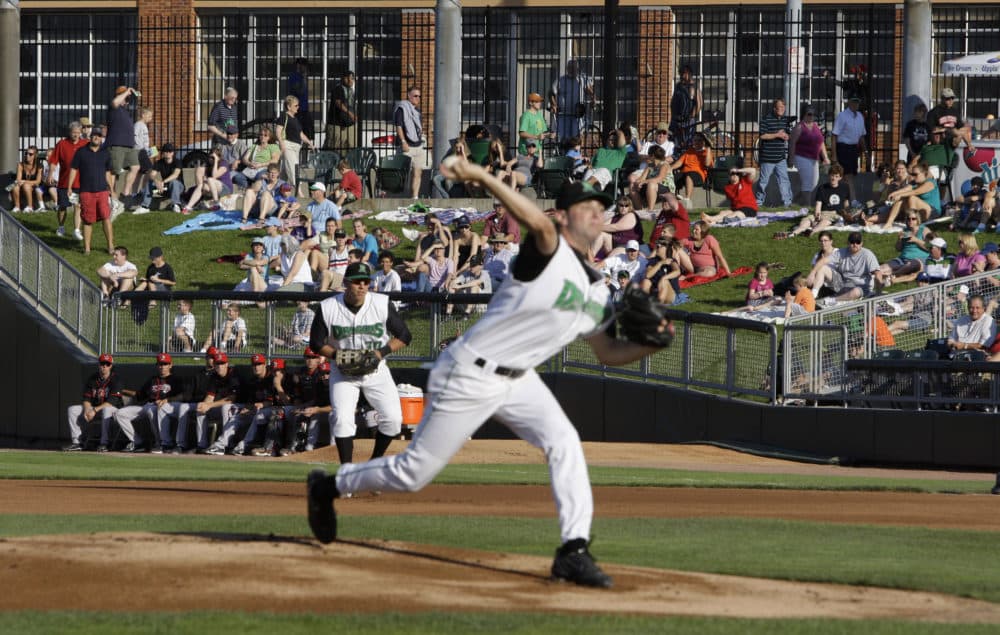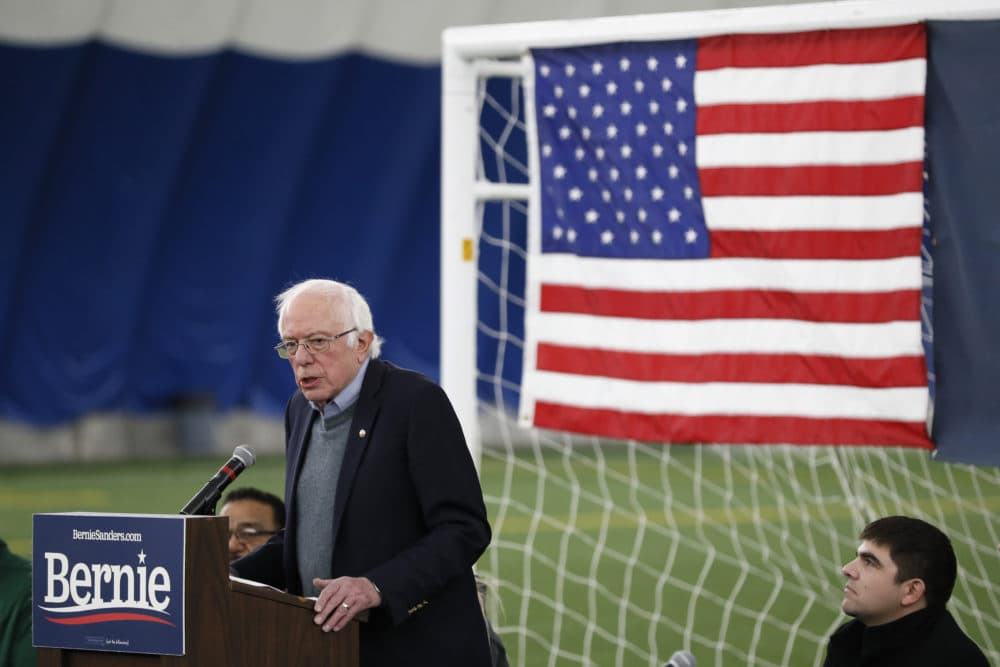Advertisement
Minor League Clubs Already Faced Uncertainty ... Then Came COVID-19

Late last week, the general manager of a minor league baseball team in Iowa accused Major League Baseball of using the COVID-19 pandemic to get rid of more than 40 minor league teams.
"They're a $13 billion industry, and they're picking on some of these smaller minor league clubs," Clinton LumberKings GM Ted Tornow told the Des Moines Register. "Just arbitrarily wipe us off the face, and really upend the structure of minor league baseball — it makes no sense at all."
J.J. Cooper, who's been covering this story for Baseball America, helped us make sense of what's going on.
KG: To really understand this story, I want to take you back, all the way back, to 1963 when the first Professional Baseball Agreement, or PBA, was put into place. So, what did the PBA do?
JC: In the late '50s, early '60s, there really was a legitimate question about whether minor league baseball was sustainable, which was a kind of shocking development at the time. Because, you go back right after World War II, pretty much, if you were in a town in the U.S., you probably had a minor league team. There were over 400 teams. Millions — 40 million-plus fans going to games.
And then you turn around 10 years later, TV had really kind of taken away that audience. Major League Baseball stepped in and said, "We're going to support you so that you can have a minimum number of teams, because we need the teams to develop these players."
KG: And under that system, minor league players are actually paid by the major league teams that hold their contracts, right?
JC: Absolutely. The players themselves, coaching staffs as well, [are paid by Major League Baseball clubs]. But when it comes to putting on the games, when it comes to the travel, when it comes to all those things, that's the responsibility of the minor league team, the minor league owner.
KG: So I don't want to suggest that everything moved along swimmingly from 1963 until now. In fact, the entire system almost fell apart in 1990. So tell me about that.
JC: What happened is: minor league baseball started to become actually a viable business. "Bull Durham," the movie, comes out, which actually I think really did play a big part in kind of romanticizing the appeal of going to a minor league park.
In 1990, Major League Baseball owners looked at minor league baseball and said, "Wait a second. Why are we footing so much of the bill if they're having success?” And the two sides almost walked away from each other. It got bad enough that — every December, there's a winter meetings where everyone in baseball [at the] professional level gets together. And that year, they actually went to their separate cities. They didn't — they couldn't even get together.
Cooler heads prevailed, and a deal was reached. And that kind of led to, I would say, almost 30 years of detente. It really hasn't been a contentious argument until we get to here in 2020.
KG: All right. So let's set the scene for what happened last fall. On the one hand, minor league teams had a pretty good 2019 season. Attendance was up. Spirits were high, right?
JC: Yes, absolutely.
KG: On the other hand, a federal appeals court allowed a class action lawsuit that alleges that minor league players are being paid less than minimum wage. And this could cost Major League Baseball quite a lot of money, right?
JC: Oh, absolutely. In essence, a minor league player right now has to show up in February or early March. They may only get paid from June to September, even though they're required to be there from February to maybe October. Major League Baseball is facing some potential for, you know, court liability there.
"[A minor league player] may only get paid from June to September, even though they're required to be there from February to maybe October."
J.J. Cooper
And Major League Baseball has already come out and said, for next year, that they are raising salaries for minor league players. They have said one of the reasons that they want to cut the number of teams is the idea that that would allow them to pay those remaining players more than they do under the current system.
KG: And that leads to the proposal MLB made in October. In a nutshell, what would that proposal do?
JC: Major League Baseball's proposal was: "We’re gonna go from 160 [teams] to 120." That means that every Major League team would have four ticket-buying clubs: low-A, high-A, AA, AAA. As you might imagine, the reception from minor league baseball upon hearing the proposal to cut one fourth of their membership was, "We are strongly, vehemently and utterly opposed to such a plan."
KG: So both sides met at these winter meetings to talk about this. Describe that scene for me.
JC: I've been going to winter meetings for close to 20 years, and I would describe it as probably the frostiest winter meetings that I've ever been a part of. And, to be honest, at the winter meetings, there wasn't a whole lot of progress made. What minor league baseball realized after that was: the best hope of winning this negotiation was to win the battle of public opinion and win the battle of political pressure.

And so there was a pretty intensive lobbying campaign afterwards, where you saw U.S. representatives from all around the country, mayors, governors, all kind of trying to turn up the temperature, put pressure on Major League Baseball to back away from this 120 plan. Then everything changed.
KG: Right, right. So then, of course, the coronavirus forced teams to send players home from spring training. Opening day was postponed. And, even if Major League Baseball returns without fans in the stands, minor league teams likely won't. So what does that leave these minor league clubs for revenue?
JC: Almost nothing. They'd had a normal offseason. They had staffed up to be ready for what they thought was gonna be a very successful season. They had bought all their — a lot of their merchandise and all that they're going to sell this year. ... In the offseason, you don't make almost anything. I mean, the minor league teams make their money when people walk through the gates. They bought a ticket. They're going to buy a hat. They're going to buy a beer. They're going to buy a hot dog. All of that money just was turned off right before [the season] started.
KG: So how did that change this conversation?
JC: It dramatically upended it, I would say. We went from having public pressure and political pressure being MiLB's strongest weapon in this negotiation — and, on both ends, the air almost immediately went out of the balloon. I mean, there are bigger things going on in the country right now, obviously. Not to diminish this, but there just are.
And on top of that, minor league baseball is a sales-driven business. Well, not having that schedule, not having that certainty when someone says to you, "Are you really going to be here next year?" — that adds more difficulty, and really adds more impetus on the minor league side to get to a deal, where there is no similar time pressure for Major League Baseball.
KG: And now it looks like MLB is going to get what it wants …
JC: Right, I mean, there is no deal yet, but there seems to, now, be much more of an acceptance on the minor league side that it is gonna be 120 full-season, affiliated clubs. But MLB is publicly professing to ensure that these cities that currently have affiliate baseball [would still] have baseball, whether it's gonna be an independent professional league or whether it's a summer wood bat league ... where [college players] come to play in the summer.
"If you were trying to design a way to ensure that this plan went through, you couldn't do something much more effective than what the coronavirus has done."
J.J. Cooper
So baseball can survive. If you have a stadium, and you have an operator who knows what they're doing, [in] a lot of these cities, baseball will survive. I don't want to discount, though, you are going to lose something. Because Vladimir Guerrero Jr. is now playing for Toronto, but it wasn't that many years ago that he was playing in the Appalachian League. And so, anywhere around that league of really small towns, you had the chance to see a guy who's gonna be one of the biggest stars in baseball. That part's gonna be taken away. And there is something that I romanticize about that, because it's formative of my baseball fandom.
KG: So when Ted Tornow, GM of the Clinton LumberKings, tells The Des Moines Register that MLB is using the COVID-19 crisis to force these changes through. Is he right? Is he overstating it?
JC: The way I've had it put to me is: if you were trying to design a way to ensure that this plan went through, you couldn't do something much more effective than what the coronavirus has done. Before this happened — we're talking last October — it may be something like, “No, I'm going to fight to the last degree to save my team being affiliate baseball.”
Well, if that owner gets to June of this year, and they're looking at their balance sheet, and there's a plan in this [new agreement] where they continue to have baseball going forward in an economically sustainable way, and potentially there's compensation, which may help — to be honest — pay some of the sponsors and all that you owe money right now, that may sound a whole lot different now, because we've gone through an almost unimaginable circumstance than it did if we were talking last October.
J.J. Cooper is the executive editor of Baseball America.
This segment aired on May 2, 2020.

